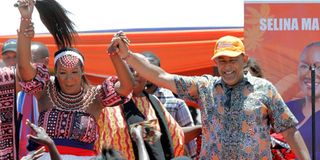Mombasa governor candidates walk tight rope on ethnic, gender balancing

Governor aspirant Suleiman Shahbal (right) unveils his running mate, Selina Maitha Lewa, the sister of former Cabinet Minister Karisa Maitha, in Mombasa on March 24, 2022.
The recent unveiling of governor aspirant Suleiman Shahbal’s running mate has put into sharp focus the tough balancing act of aspirants in choosing deputies in cosmopolitan Mombasa County.
Mombasa’s diversity in ethnicity, cultural identity and religion makes it unique among counties in the region.
Since 2013, this factor has guided governor aspirants as they seek to please all sections of the population in a bid to secure votes.
The choice of running mate in Mombasa, political analysis says, must be guided by gender, religion and ethnicity if a governor aspirant is to get votes from all corners of the county.
That is tricky, says Prof Halimu Shauri, a lecturer at Pwani University.
Aspirants, he said, must also consider how magnetic their running mate is.
Prof Shauri notes that Mr Shahbal, in choosing Ms Selina Maitha Lewa as his running mate, considered several factors, among them ethnicity and gender.
“The Mijikenda community is the largest in Mombasa County. Mr Shahbal has considered issues relating to religion, ethnicity and gender in his choice of Ms Lewa,” he said.
Prof Shauri says women make up a large constituency of voters and the choice of a woman as a running mate greatly influences the voting pattern.
The cosmopolitan nature of Mombasa makes it unique on choices to be made for running mates, says Ms Maimuna Mwidau, another political analyst.
Ms Mwidau says a governor who chooses a woman as a running mate has a big chance of getting a large chunk of women’s votes.
“Women issues cut across the board regardless of their religion or ethnicity,” said Ms Mwidau, who ruled out cultural influences as having an impact on the election of governor.
The choice of a running mate, says political marketing consultant Bozo Jenje, comes down to a community that has influence in a particular area.
In Mombasa, he says, the Mijikenda and the Swahili are the two dominant communities.
“Observers feel that the two communities should be included in the leadership of Mombasa, since failure to recognise them is a recipe for loss in an election,” he said.
Although Mr Shahbal said he chose Ms Lewa because she is fit for the position, political analysts believe it was a tough balancing act.
In choosing Ms Lewa, Mr Shahbal seemed to have considered the Mijikenda vote and the gender issue, with the hope that the running mate will influence women's votes.
Ms Lewa is a younger sister of former outspoken Cabinet minister and Kisauni MP Karisa Maitha, who died in 2004 while on a work trip in Germany.
In 2013, Mombasa Governor Hassan Joho picked Ms Hazel Katana as his running mate, a move seen as seeking to consolidate the Mijikenda vote and tap into women’s votes.
But in 2017, Mr Joho picked Dr William Kingi, who comes from the Mijikenda community.
In the same elections, Hassan Omar, who vied for the governor’s seat, chose Ms Linda Mariwa Shuma, a move that was seen as targeting women and youth votes.
The other contenders – Abdulswamad Shariff Nassir, Dr William Kingi (ODM), Hassan Omar (UDA) and Ali Mbogo (Wiper) – have not named their running mates.





